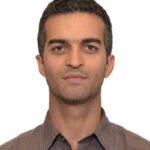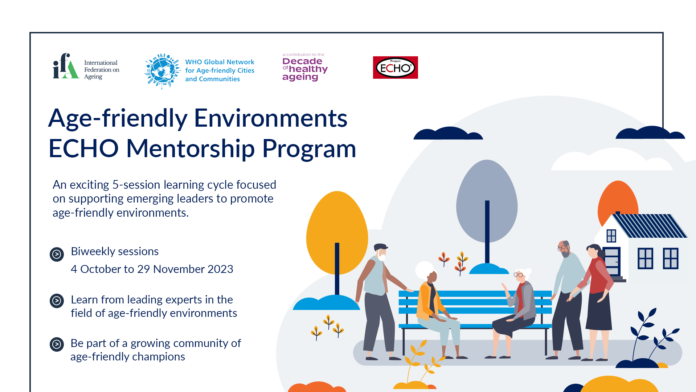Are you passionate about making the world a better place for all of us as we grow older? Do you want to lead the way in creating age-friendly cities and communities? If so, we’ve got an exciting opportunity just for you! Welcome to the second edition of the AFE ECHO Program, a ground-breaking initiative that’s all about learning, sharing, and driving change.
What’s the Buzz About?
The MENARAH Network is thrilled to continue supporting the WHO UN Decade of Healthy Ageing and the WHO Global Network for Age-Friendly Cities and Communities. This time, we’re extending a warm invitation to emerging leaders from around the globe, particularly from the Middle East and North Africa, to be part of something truly innovative and thrilling—the AFE ECHO Program!
Why You Should Get on Board
Imagine a space where you can connect with like-minded individuals, tap into expert knowledge, and work collaboratively to solve age-friendly challenges. That’s precisely what the AFE ECHO Program offers! It’s your chance to gain essential skills for championing age-friendly models in your city or community.
Background Check: WHO GNAFCC
The WHO Global Network for Age-Friendly Cities and Communities (GNAFCC) was born in 2010 with a shared mission—to make communities great places to grow old. Members of this global network, connected through “Age-friendly World,” access tools and resources, exchange ideas, and learn from each other.
Mentorship Matters
Experienced leaders mentoring newcomers can make a world of difference. Recognising this, the WHO partnered with the International Federation on Ageing (IFA) to create the Age-Friendly Environments Mentoring Programme (MENTOR-AFE). While this program was in high demand, many eager future leaders are still seeking guidance.
Introducing AFE ECHO
To meet this demand, WHO and IFA have introduced the Age-Friendly Environments (AFE) ECHO—a dynamic, multi-session learning cycle designed to meet the needs of mentee applicants. It aligns perfectly with WHO’s guidance on age-friendly cities and communities.
What’s on the Curriculum?
Over two months, the multi-session learning cycle spans five one-hour bi-weekly sessions from 7:00 AM to 8:15 AM ET. Each session builds upon the last, making attendance at all sessions crucial. But here’s the exciting part—after each session, you can have a 15-minute optional Q&A with our expert Hub Team! Key experts include renowned figures like Dr. Thiago Hérick de Sa from the World Health Organization and Dr. Samuèle Rémillard-Boilard from the Université de Sherbrooke.
Take advantage of this incredible opportunity to shape the future of age-friendly cities and communities. Join us in the AFE ECHO Program, where knowledge grows, networks expand, and innovation thrives. Together, we can make the world a better place for everyone, regardless of age! 🌍👵👴
Mark your calendars and get ready to embark on this inspiring journey. Age-friendly futures start here! 🚀✨
Please contact Cera Cruise at ccruise@ifa.ngo should you have any questions or would like any additional information about the Age-Friendly Environments ECHO Mentorship Program.
AFE-ECHO_Program-Curriculum
Thiago Hérick de Sá, World Health Organization
Thiago Herick de Sa is a Technical Officer at the Demographic Change and Healthy Ageing Unit, the World Health Organization Head Quarters in Geneve. Thiago holds a degree in Sports Science, and Masters and PhD degrees in Public Health. He started his career as a physical educator, working with older people at hospitals, primary care settings and households in Brazil. From 2010, Thiago worked as a researcher in Brazil and in the UK, with a track record of scientific publications in high-impact journals.
Thiago joined WHO in 2017 to support the work around urban, transport and health, including the development of WHO’s Urban Health Initiative (ongoing) and WHO’s Urban Health Research Agenda (2022). He also led the development of several technical resources such as the Sourcebook on Integrating Health in Urban and Territorial Planning (2020) and the adaptation for global use of the HEAT tool (2021).
In 2022, Thiago joined the Department of Social Determinants of Health to lead the work on Age-friendly environments, including the Global Network for Age-friendly Cities and Communities.


